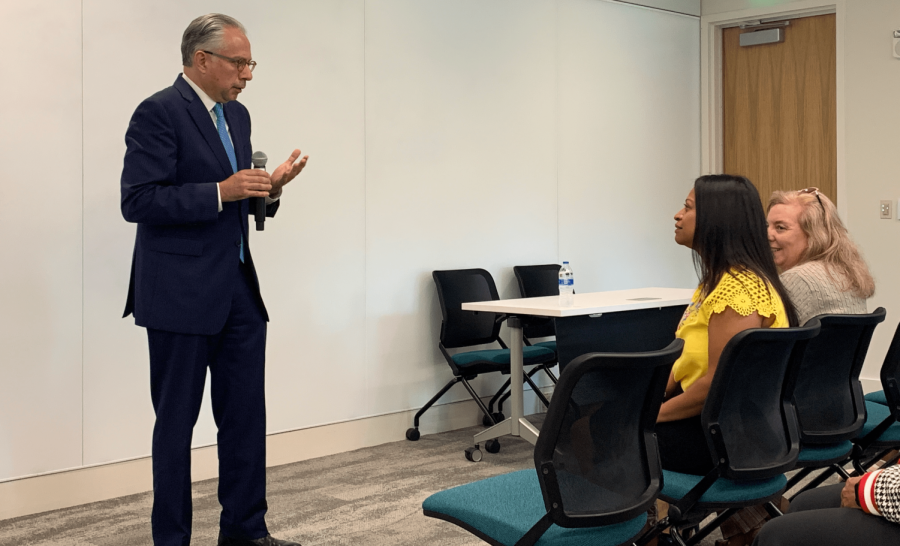Mexican embassy official speaks on relations with US
Rafael Laveaga, the chief of the Consular Section at the Mexican Embassy in Washington, speaks about relations between Mexico and the United States for a Hispanic Heritage Month event.
October 19, 2022
The relationship between the U.S. and Mexico has grown over time from distant neighbors to close economic and cultural allies, an official from the Mexican Embassy told administrators and students on Oct. 12.
The U.S. and Mexico did more than $660 billion in trade in 2021, with more than $4 billion between Mexico and Maryland alone, according to Rafael Laveaga, the chief of the Consular Section of the Mexican Embassy in Washington.
Increased trade between the two countries, along with the 31 million people with family or business ties to both the U.S. and Mexico, are key for “economic interdependence,” Laveaga said.
“We’re neighbors and we’re trading partners,” Laveaga said. “I think we’re becoming somehow very close, even in terms of family.”
Laveaga said Latinos in the U.S. work hard, including many who accept multiple shifts a day.
“Mexico and the United States have much more things in common than it’s commonly believed,” Laveaga said.
Laveaga said allowing more Mexican temporary workers into the U.S. could cut the number of immigrants detained crossing the U.S. Mexico border each month.
“We’ve got workers with their [temporary work visas],” Laveaga said. “And they come in April; they leave in December. Well paid with insurance. The owner of the businesses … provides housing. It’s a pretty good agreement.”
Mexican temporary workers pick almost all of the crabs harvested on the Eastern Shore, Laveaga added.
The Mexican consulate assists Mexican citizens visiting or living in the U.S. with issues such as passports, consular IDs, birth and death certificates, and connecting people with lawyers or organizations who can help them.
Laveaga’s speech was one of many in-person events during AACC’s Hispanic Heritage Month in October.
AACC President Dawn Lindsay said the speech was an “incredible opportunity” for students, and said she hopes to host Laveaga again.
“I feel very privileged that we had the opportunity to have somebody like Rafael come to our college,” Lindsay said. “This kind of lecture is really important for us as we’re working to continually meet our students where they are, and our commitment to diversity and making sure that we’re providing people with information to help educate them.”
Student success and retention adviser Samuel Cordero-Puchales agreed.
“As we develop and we work in areas of academics, we can see what the needs of the community are and see how we maybe we can address [them] from an academic perspective,” Cordero-Puchales, who organized AACC’s Hispanic Heritage Month celebration, said. “It’s good to create awareness, create dialogues.”
Vice President for Learning Tanya Millner called Laveaga a “superstar.”
“As an institution that focuses on lifelong learning,” Millner said, “we always take the opportunity and we take advantage of all of our superstars in our community and around our neighborhoods to learn more about their diversity of culture to learn more about their language, their politics and their needs.”
First-year pre-legal studies student Ashley Flores-Gonzalez said the speech was helpful to combat false assumptions about Mexicans.
“I’m just glad people came to this event,” Flores-Gonzalez said. “Because sadly, we have a lot of people who think Mexicans are bad people, [that] they’re smugglers and things like that. And I’m just glad he explained well, we’re not that, we’re just here to have an opportunity to have a good life.”












